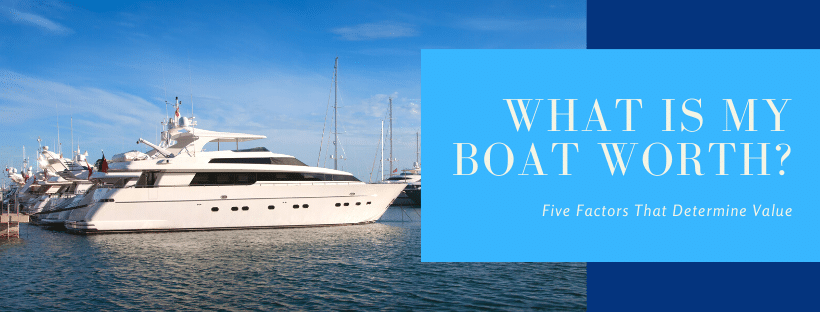
Age and Model Year
Fill out any Boat Evaluation Form, and you will likely see age or model year listed near the top. This is because age is one of the most common factors used to calculate value. Generally, newer boats will be worth more than older boats, with the assumption that older boats will require more maintenance and that they will have dated technology. It can also be more difficult to market an older boat because age can scare potential buyers, and it can be harder to secure financing. Of course, age is not always important though, since older boats can be restored, repowered, or upgraded to make them even better than their newer counterparts.
There are also situations where the model year can significantly raise or lower the value of a vessel, even if the boat is relatively new. For example, a certain manufacturer may have had warranty issues for a specific model year, or maybe their boats were installed with engines known to have issues. If this were the case, the value of the boat in question could be drastically reduced. An experienced broker should be able to give you more insight into which model years are more or less popular.
Condition
Even more important than age, condition is oftentimes the largest determinant of vessel value. A boat that has been meticulously maintained and is in pristine condition will almost always be worth more than a newer model in worse shape. We all know that boats can deteriorate quickly if not taken care of, so you will be rewarded by the market if you invest the time and money to keep it up.
It is not unusual to see listings advertising boats as “lift kept”, “captain maintained”, or “stored in covered slip” – this is because buyers want to know that they are buying a boat in the best condition possible. However, you should be careful to not misrepresent the condition of your boat, as it will be immediately noticeable to anyone interested.
Make and Model
Despite age, there are certain boat makes and models that hold their values better than others. Each boatbuilder has its own reputation, and this goes a long way when it comes time to sell your boat. At Bluewater we aim to represent only the highest quality boat lines, and this is because we have seen that these boats maintain their values much better over the long run. While the majority of vessels are depreciating assets, the rate at which they change in value can vary greatly. The rate at which boats’ values change is partly determined by the brand. In general terms, the higher the quality of the brand and the lower the production levels of the builder, the better chance that a boat will hold strong valuations on the market.
That being said, there are also certain boat models that are constantly in demand and are able to retain value for years after their initial purchase. We see this with models such as the Regulator 26FS, which despite being discontinued nearly a decade ago, remain in demand from our customers.
Vessel History
The background of a vessel can have a tremendous impact on its value, especially if there has been significant damage done in the past. It is not unusual to see boats for sale that have been damaged by storms, sunk, or caught on fire. Even if restored, these problems can deter buyers, which will make it tougher to sell on the open market.
Conversely, a boat with a complete record of service history will be more valuable because buyers will be confident that they are making a solid investment. Make sure to always keep track of completed service work so you can avoid potential concerns from buyers.
Options and Accessories
More is almost always better when it comes to options and accessories. When buying new boats, there are usually dozens of options available, and these can really add up when you go to sell. Some common accessories include stabilizers, sound systems, electronics packages, thrusters, and engine upgrades, but there are countless options available from different manufacturers.
Obviously, some options will have a much greater impact on value than others, but even the smaller additions can make a difference. Always let your broker know about all installed upgrades and options when you decide to put your boat on the market.
While these are the top five most commonly considered factors to calculate values, there are plenty of other factors that can skew the numbers up or down. The best way to find out how much your boat is worth is to contact an experienced Sales Professional who knows the market. If you are ready to sell, make sure to reach out to the Bluewater Yacht Sales team, and then view our guide on the Top Tips for Selling Your Boat.